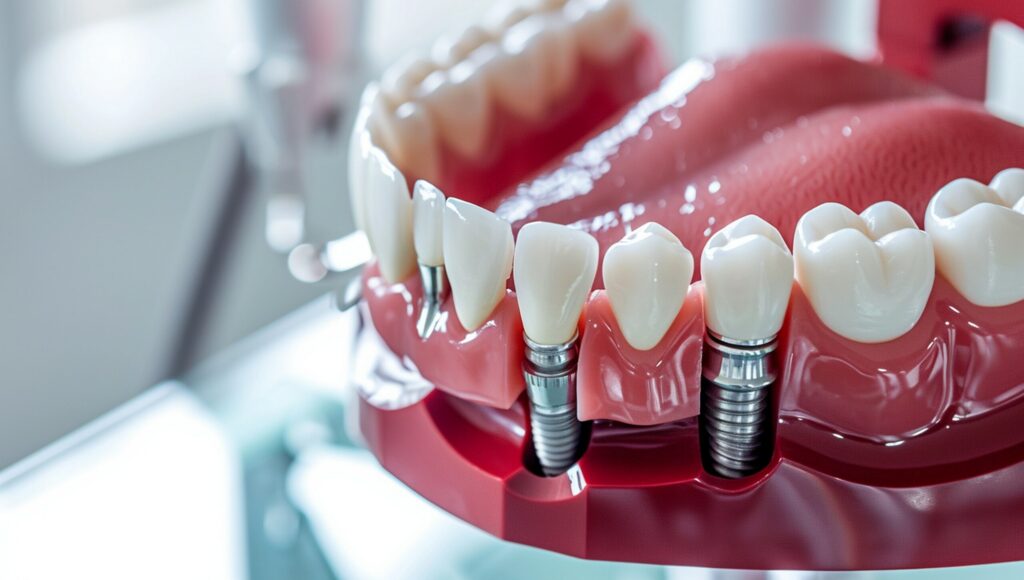One of the most frequently asked questions by patients considering a full mouth restoration is direct and understandable: Are full dental implants painful? The simple answer is no. The procedure itself is not painful, as it is performed under local anesthesia or conscious sedation. Most patients feel pressure during the surgery but not pain. However, like any surgical process, there can be temporary discomfort during the recovery phase.
This guide will help you understand what to expect regarding pain levels, healing time, pain management options, and how full dental implants compare to other dental procedures in terms of overall comfort.

What Will You Read?
What Are Full Dental Implants?
Full dental implants refer to a complete replacement of the upper, lower, or both arches using dental implants. Unlike removable dentures, implants are permanently fixed into the jawbone and support either a fixed bridge or a full prosthesis.
Common Types of Full Mouth Implant Solutions
- All-on-4: Four implants per arch used to support a full row of teeth
- All-on-6 or All-on-8: More implants for added stability
- Individual implants: One implant placed for each missing tooth
These treatments restore complete oral function and aesthetics for patients who have lost most or all of their teeth.
Does the Implant Surgery Hurt?
During the Procedure
The surgery itself is not painful. Dentists use local anesthesia to numb the surgical area. Many clinics also offer:
- Oral sedation to help you relax while remaining conscious
- IV sedation to place you in a deeper state of calm
- General anesthesia in complex or lengthy cases
With proper anesthesia, you should not feel pain during the operation. Patients typically report pressure or vibration, but not sharp or intense sensations.

After the Procedure
Once the anesthesia wears off, mild to moderate discomfort is expected for the first few days. Most patients describe this as tolerable and short-lived.
Common post-surgical symptoms include:
- Swelling of the cheeks and gums
- Mild bruising around the surgical area
- Tenderness in the jaw
- Light bleeding within the first 24 hours
These effects typically subside within 3 to 7 days and can be managed with routine care.
How Painful Is the Healing Process?
The healing period is generally manageable and not described as intensely painful by most patients. You will receive aftercare instructions to minimize discomfort and promote proper healing.
Pain Timeline
| Time After Surgery | Pain Level | Description |
|---|---|---|
| First 24 hours | Mild to moderate | Managed with painkillers and rest |
| Days 2–3 | Mild | Swelling may peak but pain starts to decrease |
| Days 4–7 | Minimal | Most patients feel significantly better |
| After 1 week | Very low to none | Normal eating may resume with caution |
What Factors Influence Pain Levels?
Pain varies depending on individual conditions and the specifics of the procedure.
Key Influences
- Number of implants placed
- Whether bone grafting was required
- Simultaneous extractions
- General health and healing capacity
- Experience and technique of the dental team
Those who follow pre- and post-op guidelines tend to recover faster and report less discomfort.
How Do Full Dental Implants Compare to Other Procedures?
Dental implants are often perceived as less painful than other invasive dental treatments such as:
- Tooth extractions
- Root canal therapy
- Gum surgeries
| Procedure | Reported Pain Level | Type of Anesthesia Used |
|---|---|---|
| Tooth extraction | Moderate | Local anesthesia |
| Root canal | Moderate | Local anesthesia |
| Implant placement | Mild to moderate | Local or sedation |
| Bone grafting | Moderate | Local or sedation |
Most patients are surprised to find that implant surgery involves less pain than expected.
Pain Management Options
You will be given a customized pain control plan that may include:
- Over-the-counter medications like ibuprofen or acetaminophen
- Cold compresses to reduce swelling
- Antibiotics to prevent infection
- Antiseptic rinses to keep the area clean
Additional Tips
- Stick to soft foods during the first week
- Avoid alcohol, smoking, and spicy foods
- Get plenty of rest and fluids
- Elevate your head while sleeping to reduce swelling
Emotional Impact and Anxiety Management
Fear of pain is a major barrier for many patients. Understanding that implant procedures are well-managed and predictable can ease anxiety.
Modern clinics often use:
- Digital surgical guides to reduce tissue trauma
- Painless injection techniques
- Minimally invasive methods for faster healing
These advancements help reduce both physical discomfort and psychological stress.
What If You Have Low Pain Tolerance?
If you are sensitive to pain, discuss available sedation options with your dentist. Clinics may offer:
- Nitrous oxide to help you relax
- Oral sedatives for pre-procedure calmness
- IV sedation for deeper relaxation
These options allow you to undergo the procedure comfortably and with minimal stress.
Long-Term Comfort After Healing
Once the healing period ends, full dental implants become as comfortable as natural teeth. There is no pressure on the gums, no risk of slippage, and no daily removal required.
Benefits You Will Notice
- Stable and secure bite
- Improved speech
- Enhanced facial support
- Freedom to eat anything
- No denture adhesives or sore spots
Most patients describe the result as life-changing and report complete comfort after the initial recovery.
Why Choose Turkey for Implant Treatment?
Pain is not just about physical sensation. It’s also about trust, comfort, and confidence in the provider. Turkey has become one of the leading destinations for full mouth implants for several reasons:
- Clinics use minimally invasive techniques
- Experienced surgeons handle complex cases with ease
- Sedation options are patient-specific
- High-quality materials such as Straumann or Osstem are used
- Treatment is fast and affordable
You can receive full dental implants in Turkey at up to 70 percent lower cost than in the UK or USA, often completed within one week.
Final Thoughts
So, are full dental implants painful? The procedure itself is not painful, due to the use of modern anesthesia and sedation techniques. While mild discomfort can occur during the healing phase, it is temporary and easily managed with medications and proper aftercare. The benefits of full dental implants, including restored function, improved appearance, and long-term comfort, far outweigh the temporary healing process.
With the right team and support system, full dental implants are one of the most comfortable and reliable solutions available in modern dentistry. For patients seeking affordability, expertise, and a smooth experience, Turkey offers a highly attractive treatment option.

 Dijital Performans Ajansı.
Dijital Performans Ajansı.